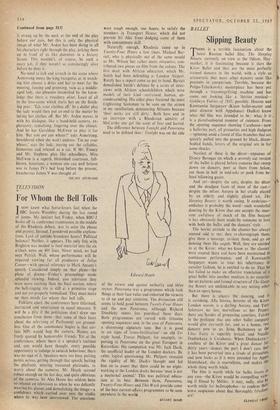TELEVISION
For Whom the Bell Tolls
',BBCknow what horse-lovers feel when the ',BBC leaves Wembley during the last round of jumps. My instinct last Friday, when BBC-2 broke off its conference tranmission in the middle of the Rhodesia dehate, was to seize the phone and ,protest. Ipstead, I pondered possible explana- tions. Lack of outside broadcast hours? Political balance? Neither, it appears. The only link with Brighton was needed to feed material into the six o'clock news on 405 lines. Never mind, we had seen Patrick Wall, whose performance will be required viewing for all producers of Julius Caesar—with special reference to Mark Antony's speech. Considered simply on that plane—the plane of drama—Friday's proceedings made splendid viewing. Indeed, qua television they were more exciting than the final session, where the bell-ringing rite is still at a primitive stage and not yet properly formalised. They must make up their., minds for whom that bell tolls.
Folklore apart, the conferences have informed, instructed and entertained in equal measure. It will be a pity if the politicians don't draw one conclusion from them--that some of their fears about the televising of Parliament are ground- less. One of the commonest bogies is that cer- tain MPs would hog the camera. Names are freely quoted by honourable friends. Yet at the conferences, where there is a speaker's rostrum and, one would have thought, every possible opportunity to indulge in swinish behaviour, there was no sign of it. Speakers were too busy putting points across, getting through that speech, baiting the platform, uttering treasured platitudes, to worry about the cameras. Mr. Heath seemed robust enough on the last day,"and quite oblivious of the cameras. Sir Alec Home has seldom been so relaxed on television as when he was defiantly wearing his glasses and demolishing the image—a confidence which carried over into the studio where he was later interviewed.' The questions were tough enough, one hopes, to satisfy the monitors in Transport House; which did not prevent Sir Alec from dodging some of them with consummate skill.
Naturally enough, Rhodesia came up in Twenty-Four Hours a few times. Michael Bar- ratt, who is physically out of the same mould as Mr. Wilson but rather more simpatico, con- tributed two pieces on film from the colony. The first dealt with African education, which Mr. Smith had been defending at London Airport. Rarely has a report come so pat to hand. Barratt demolished Smith's defence by a series of inter- views with African schoolchildren which were models of their kind----restrained, human, un- condescending. His other piece featured the most frightening Scotsman to be seen on the screen in my recollection, denouncing Africans because 'their necks are still dirty.' Both here and in an interview with a Rhodesian admirer of McCarthy one got the scent of fear and hatred.
The difference between Tonight and Panorama used to be defined thus: Tonight was on the side
Edward Heath
of the viewer and against authority and hides revues; Panorama 'was a programme which took things at their face value and exhorted the viewers to sit up and pay attention. The distinction still seems to hold good between Twenty-Four Hours and the new Panorama, although Richard Dimbleby seems less pontifical these. days. Both programmes are •cursed with tiresome opening sequences and, in the case of Panorama, a distressing signature tune. But it is good to see signs of 'cross-fertilisation'--an old To- night hand, Trevor Philpott, for example, re- porting in Panorama on the great Europort in Rotterdam. His companion was Mr. Jack Dash, the unofficial leader of the London dockers. By calm, logical questioning Mr. Philpott revealed the rigidity of Mr. Dash's thought and led him on to assert that there could be no night- working at the London docks because 'man is not a nocturnal animal.' This was political educa- tion at its best. Between them, Panorama, Twenty-Four Hours and This Week provide some of the best current-affairs programmes to be seen anywhere in the world.
STUART HOOD






























 Previous page
Previous page